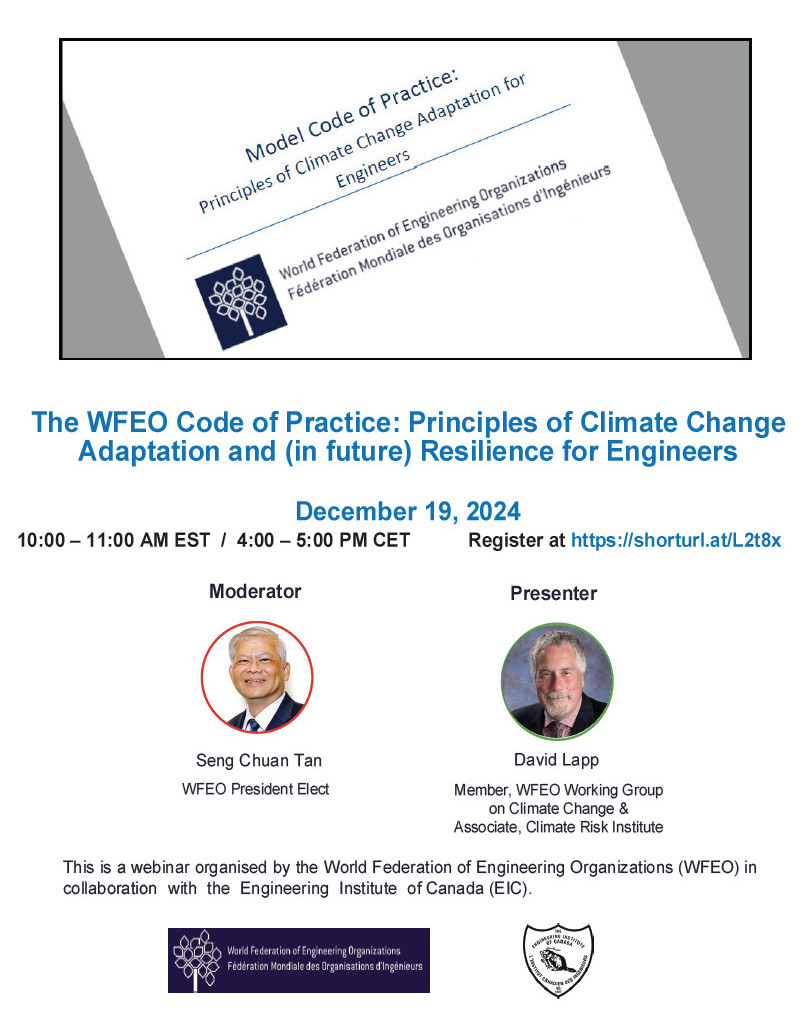

The WFEO Working Group on Climate Change, in partnership with the Engineering Institute of Canada (EIC) will present the webinar entitled “The WFEO Code of Practice: Principles of Climate Change Adaptation and (in future) Resilience for Engineers” on 19 December 2024 at 10:00 – 11:00 AM EST / 4:00 – 5:00 PM CET.
The registration link is available in this page: shorturl.at/L2t8x
Abstract
The climate is changing. Historical climatic design data has become less representative of the future climate. Many future climate risks may be significantly under-estimated. Engineers cannot assume that the future will be similar to the past. Historical climate trends cannot be simply projected into the future as a basis for engineering planning, design, operations and maintenance of infrastructure.
Adapting current and future infrastructure to be resilient to extreme weather events and long term climate changes over their long service life has become a societal imperative. Engineers need to understand and play a key role in achieving this goal as an integral part of their practice. They must keep themselves informed about the changing climate, and consider its potential impacts on their work.
The WFEO and its national and international members are committed to raising awareness among engineers about the potential impacts of the changing climate and how these relate to engineering of existing and future civil infrastructure and buildings. As such, the WFEO Model Code of Practice on Principles of Climate Change Adaptation for Engineers was developed and published in December 2015 to provide practice guidance to engineers to consider the implications of climate change in their professional practice and creating a clear record of the outcomes of those considerations.
The Model Code was prepared by the WFEO Standing Technical Committee on Engineering and the Environment and subsequently distributed to national and international members with a recommendation to adopt as policy and practice guidance for their own engineers.
In 2023, the WFEO Working Group on Climate Change – the group now charged by WFEO to engage in climate and engineering issues is currently updating the document to include principles of climate resilience and the application of nature-based solutions that have been developed and applied in the 10 years since the Model Code was published.
This presentation will introduce and explain the nine principles contained in the published document and introduce new principles under consideration related to climate resilience and the integration of nature-based solutions.
Moderator:
- Seng Chuan Tan, WFEO President-Elect.
Presenter:
- David Lapp, Member, WFEO Working Group on Climate Change & Associate, Climate Risk Institute (Canada).
For more information:
WFEO Working Group on Climate Change website
David Lapp P.Eng. FCAE FEC IRP
David is a professional engineer who graduated with a Bachelor of Applied Science in Geological Engineering from the University of Toronto in 1978. Following a career of nearly 20 years in consulting engineering, David joined Engineers Canada in 1997 and for the next 23 years he assumed a variety of roles in international affairs, engineering qualifications and international affairs, co-authoring several national and international practice guidelines related to sustainability, environmental stewardship and climate change.
From 2005 to 2020, David served as the project manager for the development, implementation and on-going program operation for the Engineers Canada PIEVC Protocol, a structured process to assess infrastructure climate risks and vulnerabilities to inform the design and operation of climate resilient infrastructure.
Between 2007 and 2015, David served as the Secretary for the World Federation of Engineering Organization’s Committee on Engineering and the Environment for host Engineers Canada focusing on climate change, environment and infrastructure issues at the international level, including continuing active engagement with UN Framework Convention on Climate Chnage. He continues to volunteer on the Committee as Engineers Canada’s representative.
In September 2020, he joined the Institute for Catastrophic Loss Reduction (ICLR) as a part-time Senior Adviser for Resilient Infrastructure for the next 15 months. In September 2022, he joined the Climate Risk Institute as an Associate.
David is a Fellow of the Canadian Academy of Engineers (FCAE), a Fellow of Engineers Canada (FEC) and holds the Infrastructure Resilience Professional (IRP) credential. In 2018 he was given an Award for Engineering Excellence from Professional Engineers Ontario (PEO) for his work on climate change and engineering as well as an Engineering Excellence Award in the same year from the PEO Ottawa Chapter.
